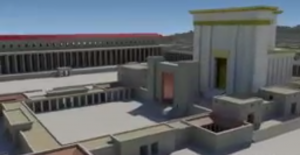 ORLANDO – A professor at a Baptist seminary is developing a virtual tour of ancient Israel that will allow the public to experience the Holy Land without traveling across the world.
ORLANDO – A professor at a Baptist seminary is developing a virtual tour of ancient Israel that will allow the public to experience the Holy Land without traveling across the world.
Dr. Dan Warner is an associate professor of Old Testament and archaeology at New Orleans Baptist Theological Seminary’s Orlando location. According to his academic profile, Warner is the director of the seminary’s Center for Archaeological Research. He is also an adjunct faculty member at the Baptist College of Florida and Palm Beach Atlanta University, and earned his Ph.D. at the College and University of Bristol, England.
In 1999, Warner launched plans for “The Virtual Bible”—an ambitious project designed to give virtual tours of the Holy Land. Since time and financial constraints prohibit many Christians from personally visiting Israel, Warner wants his program to give believers an affordable, immersive, virtual view of Biblical lands.
At first, Warner’s dream encountered a rocky start, and he struggled to find a publisher willing to support the project. However, with help from fellow archaeologist James Strange and a group of private investors, The Virtual Bible project has made significant progress in recent years. The publisher of Logos Bible Software also recently agreed to help Warner distribute his program.
According to Baptist Press, thus far, Warner and his team have completed virtual reconstruction projects of four Biblical locations—including Capernaum and Herod’s Jerusalem. These four completed projects, says Warner, are just the beginning.
“Our goal is to create the whole ancient world,” he told Baptist Press. “We’ve just barely scratched the surface.”
Warner combines his archaeological expertise with personal excavations in Israel to produce The Virtual Bible.
“Our goal here is to create realistic, virtual tours of the Holy Land, built upon the way it would have looked during Biblical times,” a promotional YouTube video for the project explains. “These productions are based upon the latest archaeological information and historical sources from expert Biblical archaeologists, using the latest in animation technology.”
The Virtual Bible will feature 3D, computer-animated renditions of Biblical towns and events. Warner hopes that one day his classes will be able to meet in a room with a 180 degree screen, allowing students to virtually immerse themselves into Biblical times and experience recreations of Scriptural events.
Ultimately, Warner believes that archaeology is a powerful tool for better understanding and appreciating the events in the Bible. By harnessing modern technology, he hopes The Virtual Bible will allow people to experience Biblical lands in a memorable way.
“Biblical archaeology gives us a window into the context of the Biblical world,” Warner said. “It helps us realize [that the people of the Bible] were real people, in a real time, and in a real place. They lived in houses, they had families, they had jobs.”
“It helps us understand the Biblical text through material remains and gives us illustrations of cultural situations that people participated in,” he added. “It clarifies and provides information that is not mentioned in the Biblical text.”
Photo: YouTube
Become a Christian News Network Supporter...


